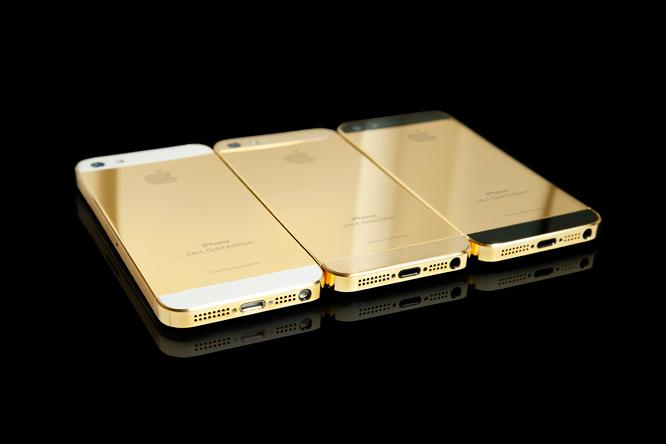
Have you heard? The next iPhone could come in gold color. What am I saying?! Of course you’ve heard! Absolutely everyone is talking about it. But for the life of me, I can’t fathom why. New iPhone models always attract considerable attention, but it’s usually about the size of the screen, the design, or the next version of the software. Lately, discussion of a gold iPhone has overtaken potentially game-changing news of a fingerprint sensor being fitted to the iPhone 5S.
If this were an actual gold iPhone, maybe there’d be something to talk about, but Apple’s not challenging Stuart Hughes anytime soon. No, it’s just a new alternative color, which will presumably join other the usual black and white at launch. This, “feature,” when announced by another manufacturer, is usually nothing more than a footnote on a news release, but this “gold iPhone” has been analyzed with more attention than Wall Street suits give to the firm’s stock price.
Long-time Apple columnist MG Siegler wrote more than 1,000 words on the subject for TechCrunch, and when AllThingsD’s John Paczkowski reported on Apple’s plans, his source cloyingly called the hue an, “elegant champagne.” Gizmodo says an iPhone 5S in a new color would be a clear way to show everyone you’ve got the latest iPhone. It’s a valid point, which could have been made in a tweet, not the astonishing 1,600 word essay. Listen up, everyone: Get over yourselves. A gold iPhone is not a big deal … at all … not in the least.
Gold phones suddenly cool because Apple’s doing it

Oh, and all the talk about it selling in China, India, and the Middle East? How many gold flagship smartphones do Samsung, HTC, Nokia, and Sony produce? By our reckoning, none. If there was this amazing demand, you’d think, at the very least, Samsung would have introduced a gold Galaxy S4, wouldn’t you? Instead, it’s all about real gold (and real nasty) phones made by third parties.
You’re putting it in a case anyway
We’re all used to a fair amount of spin when it comes to Apple, and it’s certainly not unusual for people to get over excited about an iPhone feature we’re used to seeing on other phones. But this is madness! It’s coming in a different color, not with a winning lottery ticket and the promise of dirty sex with a willing celebrity.
Now, I’m not saying a gold iPhone won’t look good, but all this hype stinks of manipulation. How depressing will it be if the iPhone 5S makes its debut, and a new range of colors is a headline feature? When Apple announced the fifth-generation iPod Touch, the new colors were mentioned only in passing (more time was spent talking about those stupid iPod Touch Loops); but more importantly, there was barely a whisper about it in the press. That’s the way it should be, too. There are far more exciting things to talk about – or there should be.
Apple fanboys, blogs, and tech journos are running amok, dribbling over the prospect of a gold iPhone, but they’re all forgetting one important point: We’ll all be putting the damn thing in a case anyway!
Editors' Recommendations
- Nomad’s new iPhone case and Apple Watch band may be its coolest yet
- 5 phones you should buy instead of the iPhone 15
- iPhone 16: news, rumored price, release date, and more
- iPhone SE 4: news, rumored price, release date, and more
- 3 reasons why I’ll actually use Anker’s new iPhone power bank




